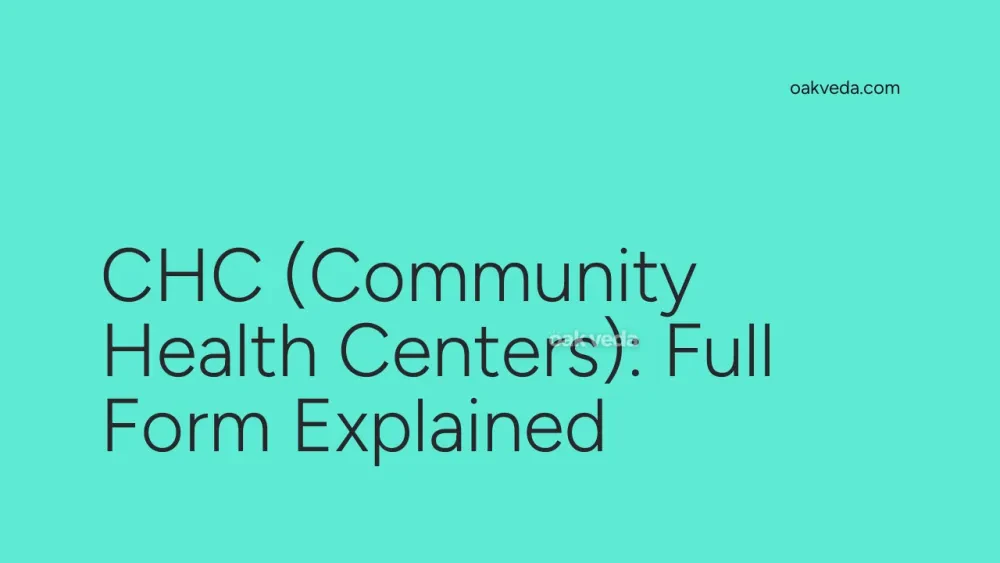
What is the Full Form of CHC?
The full form of CHC is Community Health Centers. These organizations play a crucial role in providing accessible healthcare services to underserved populations across various communities.
What is Community Health Centers?
Community Health Centers (CHCs) are non-profit healthcare facilities designed to offer comprehensive primary and preventive care services to individuals and families, particularly those who are medically underserved, uninsured, or from low-income groups. These centers aim to bridge the gap in healthcare access and improve overall community health outcomes.
Origin and Development of Community Health Centers
The concept of Community Health Centers originated in the United States during the 1960s as part of President Lyndon B. Johnson's War on Poverty. The first CHCs were established to address the healthcare needs of disadvantaged communities and promote health equity. Since then, the model has evolved and spread to many countries worldwide, adapting to local healthcare systems and community needs.
How do Community Health Centers work?
CHCs operate on a patient-centered model, focusing on the specific health needs of the communities they serve. They typically employ a multidisciplinary team of healthcare professionals, including:
- General practitioners
- Nurses
- Dentists
- Social workers
- Mental health specialists
These centers often work in collaboration with local hospitals, public health departments, and other community organizations to provide comprehensive care and address social determinants of health.
Types of Community Health Centers
While the core mission of CHCs remains consistent, there are several types of centers that cater to specific community needs:
- Federally Qualified Health Centers (FQHCs): These centers receive federal funding and must meet specific requirements to maintain their status.
- Rural Health Clinics: Focused on providing care in underserved rural areas.
- School-Based Health Centers: Located within or near schools to serve students and their families.
- Mobile Health Clinics: Provide healthcare services to remote or hard-to-reach populations.
Functions of Community Health Centers
CHCs serve multiple functions within their communities:
- Primary Care: Offering comprehensive medical services for common health issues.
- Preventive Care: Providing vaccinations, health screenings, and education.
- Chronic Disease Management: Helping patients manage long-term conditions like diabetes and hypertension.
- Dental Care: Many CHCs offer basic dental services to address oral health needs.
- Mental Health Services: Providing counseling and psychiatric care.
- Women's Health: Offering prenatal care, family planning, and gynecological services.
- Pediatric Care: Specializing in children's health and development.
Applications of Community Health Centers
CHCs have wide-ranging applications in public health and community development:
- Reducing Health Disparities: By targeting underserved populations, CHCs help bridge gaps in healthcare access.
- Emergency Response: During public health crises, CHCs often serve as frontline responders.
- Health Education: Providing community outreach and education on various health topics.
- Research: Some CHCs participate in community-based health research to improve care delivery.
Features of Community Health Centers
Key features that distinguish CHCs include:
- Community Governance: CHCs are typically governed by a board with majority community representation.
- Sliding Fee Scale: Services are provided on a sliding fee scale based on ability to pay.
- Cultural Competence: Staff are trained to provide culturally appropriate care.
- Integrated Services: Offering a range of services under one roof for comprehensive care.
- Patient-Centered Approach: Focusing on individual patient needs and preferences.
Benefits of Community Health Centers
CHCs offer numerous benefits to both individuals and communities:
- Improved access to healthcare for underserved populations
- Reduced healthcare costs through preventive care and chronic disease management
- Decreased reliance on emergency rooms for non-urgent care
- Creation of local jobs and economic stimulation
- Enhanced community health outcomes and quality of life
Limitations or Challenges of Community Health Centers
Despite their many advantages, CHCs face several challenges:
- Funding Constraints: Many CHCs struggle with limited and unstable funding sources.
- Staffing Shortages: Attracting and retaining healthcare professionals can be difficult, especially in rural areas.
- Increasing Demand: As more people seek care at CHCs, some centers struggle to meet the growing demand.
- Technological Limitations: Some CHCs may lack resources for advanced medical technologies or electronic health record systems.
Future Developments in Community Health Center Technology
The future of CHCs is likely to involve:
- Telemedicine Integration: Expanding access through virtual consultations and remote monitoring.
- Data Analytics: Utilizing big data to improve patient care and community health outcomes.
- Artificial Intelligence: Implementing AI-driven tools for diagnosis and treatment planning.
- Interoperability: Enhancing data sharing between CHCs and other healthcare providers.
FAQs on CHC Full Form
-
What services do Community Health Centers typically offer? CHCs typically offer primary care, preventive services, dental care, mental health services, and sometimes specialty care.
-
How are Community Health Centers funded? CHCs are funded through a combination of federal grants, state and local funding, patient fees, and private donations.
-
Can anyone receive care at a Community Health Center? Yes, CHCs are open to all members of the community, regardless of their ability to pay or insurance status.
-
How do Community Health Centers differ from traditional hospitals? CHCs focus on primary and preventive care, are community-governed, and often serve specific underserved populations, while hospitals typically offer a broader range of specialized medical services.
-
Are Community Health Centers only found in the United States? While the CHC model originated in the US, similar community-based healthcare facilities exist in many countries worldwide, often under different names or structures.
Community Health Centers continue to play a vital role in improving healthcare access and outcomes for millions of people worldwide. As healthcare systems evolve, CHCs are likely to remain an essential component in addressing health disparities and promoting community well-being.
You may be interested in:

